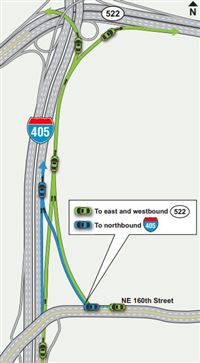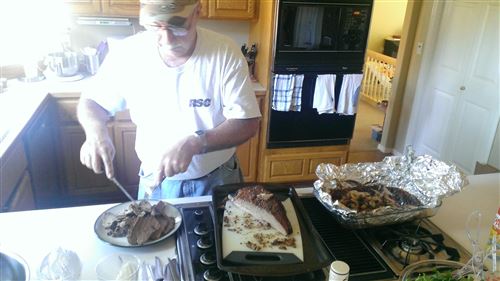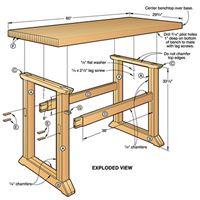 We live off of I-405 so we have been watching the huge construction project for the last couple years. The project page has all the details, but basically they are adding an HOT lane (carpoolers use it for free, single occupancy cars can pay to use it) and fixing the interchange where we live. Cars going from 405 to 522 had a hard time merging with cars going from 160th to 405.
We live off of I-405 so we have been watching the huge construction project for the last couple years. The project page has all the details, but basically they are adding an HOT lane (carpoolers use it for free, single occupancy cars can pay to use it) and fixing the interchange where we live. Cars going from 405 to 522 had a hard time merging with cars going from 160th to 405.
I had thought that after the change, we wouldn’t be able to get onto 522 from 160th St anymore but it looks like they have accounted for that in the design. That’s great for us because it means we’ll be able to head out that way without driving through the traffic mess in Woodinville.
The people who bought those townhomes right along the new braided exit ramps are going to be treated to an enormous sound blocking wall right outside their balconies. They’re going from having a view that had about 3 or 4 rows of trees between them and 405 to seeing a concrete wall 10-20 feet away. Ouch. At least the real estate market is starting to recover around here so some of the decrease will be masked.
And since I mentioned real estate, here’s a semi-related factoid: the guy who bought our condo from us sold it a few months ago. He sold it for about 20% more than he bought it so he made a little money after all the fees and taxes. Our house has gone up about 3-4 times as much as that condo did though so I still think it was a good financial move. (And it was a great move for many other reasons.)
 Mike Rowe has a new show coming out and it’s called Somebody’s Gotta Do It. There is an article posted about how this landed on CNN and why it’s different from Dirty Jobs. I’m excited to see this new show because it sounds like it really aligns with Mike’s focus on the hardworking people of America. If you want a primer on his viewpoints, check out his TED talk from 2008.
Mike Rowe has a new show coming out and it’s called Somebody’s Gotta Do It. There is an article posted about how this landed on CNN and why it’s different from Dirty Jobs. I’m excited to see this new show because it sounds like it really aligns with Mike’s focus on the hardworking people of America. If you want a primer on his viewpoints, check out his TED talk from 2008.
 I’m continually amazed by people merging in front of big trucks and semis, especially as traffic is coming to a stop. I see it every day. Why do you think the truck is leaving that space? It’s so they don’t kill the people in front of them. I wonder if it would help to add a “big rig ride along” day as part of driver’s ed. Students would go ride with a professional driver for an hour or so. Drivers would learn a lot about how long it takes to stop a truck and what cars do that is dangerous around trucks. There are likely a lot of legal and liability issues with that idea, but if implemented correctly, it might improve our overall safety.
I’m continually amazed by people merging in front of big trucks and semis, especially as traffic is coming to a stop. I see it every day. Why do you think the truck is leaving that space? It’s so they don’t kill the people in front of them. I wonder if it would help to add a “big rig ride along” day as part of driver’s ed. Students would go ride with a professional driver for an hour or so. Drivers would learn a lot about how long it takes to stop a truck and what cars do that is dangerous around trucks. There are likely a lot of legal and liability issues with that idea, but if implemented correctly, it might improve our overall safety.



 Having just switched into a new role at work, I’m keenly aware of the various stages of learning that I’m progressing through. I think it can be broken down into three stages:
Having just switched into a new role at work, I’m keenly aware of the various stages of learning that I’m progressing through. I think it can be broken down into three stages: There is a site for everything on the internet. It’s nearly impossible to come up with an idea that doesn’t exist already. But I’ve got one and I’m giving it away for free. As best I can tell, there is no good website that has downloadable (either free or for purchase) woodworking plans along with user reviews of the quality of each plan. Think about having a shopping experience like Amazon.com except it’s all woodworking plans. You could have customer submitted images of each project, reviews saying how good or bad each plan is and a catalog that is both browsable and searchable. Creators could upload their plans and get money from people who buy the plans.
There is a site for everything on the internet. It’s nearly impossible to come up with an idea that doesn’t exist already. But I’ve got one and I’m giving it away for free. As best I can tell, there is no good website that has downloadable (either free or for purchase) woodworking plans along with user reviews of the quality of each plan. Think about having a shopping experience like Amazon.com except it’s all woodworking plans. You could have customer submitted images of each project, reviews saying how good or bad each plan is and a catalog that is both browsable and searchable. Creators could upload their plans and get money from people who buy the plans. I don’t remember where I heard it, but somebody once said: “If you lined up all the cars in the world end to end, it would probably be Labor Day.” Technically I guess this holiday is about celebrating unions and the labor movement, but I’ll just enjoy a beer and some meat on the grill.
I don’t remember where I heard it, but somebody once said: “If you lined up all the cars in the world end to end, it would probably be Labor Day.” Technically I guess this holiday is about celebrating unions and the labor movement, but I’ll just enjoy a beer and some meat on the grill. A while back somebody commented that the emailed receipts from various physical stores feels like a privacy concern because they know your email. Umm… let’s take a step back and think about all the ways that you are being tracked today:
A while back somebody commented that the emailed receipts from various physical stores feels like a privacy concern because they know your email. Umm… let’s take a step back and think about all the ways that you are being tracked today:
Choosing Slower Delivery